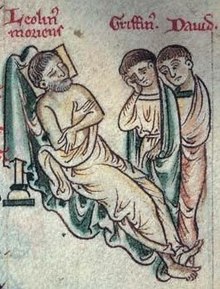
Back Ліўэлін Вялікі Byelorussian Лиуелин Велики Bulgarian Llywelyn ab Iorwerth Breton Llywelyn el Gran Catalan Llywelyn ap Iorwerth Czech Llywelyn Fawr Welsh Llywelyn den Store Danish Llywelyn ab Iorwerth German Λιουέλιν ο Μέγας Greek Llywelyn el Grande Spanish
| Llywelyn ab Iorwerth | |
|---|---|
| Prince of Aberffraw Lord of Snowdon | |
 | |
| King of Gwynedd | |
| Reign | 1195–1240 |
| Predecessor | Dafydd ab Owain Gwynedd |
| Successor | Dafydd ap Llywelyn |
| Born | c. 1173[1] Dolwyddelan |
| Died | 11 April 1240 Aberconwy Abbey |
| Burial | |
| Spouse | Joan, Lady of Wales |
| Issue |
|
| House | Aberffraw |
| Father | Iorwerth Drwyndwn |
| Mother | Marared ferch Madog |
Llywelyn ab Iorwerth (pronounced [ɬəˈwɛlɪn ab ˈjɔrwɛrθ], c. 1173 – 11 April 1240),[2][3] also known as Llywelyn the Great (Welsh: Llywelyn Fawr, [ɬəˈwɛlɪn vaʊ̯r]), was a medieval Welsh ruler. He succeeded his uncle, Dafydd ab Owain Gwynedd, as King of Gwynedd in 1195. By a combination of war and diplomacy he dominated Wales for 45 years.[4]
During Llywelyn's childhood, Gwynedd was ruled by two of his uncles, who split the kingdom between them, following the death of Llywelyn's grandfather, Owain Gwynedd, in 1170. Llywelyn had a strong claim to be the legitimate ruler and began a campaign to win power at an early age. He was sole ruler of Gwynedd by 1200 and made a treaty with King John of England that year. Llywelyn's relations with John remained good for the next ten years. He married John's natural daughter Joan in 1205, and when John arrested Gwenwynwyn of Powys in 1208, Llywelyn took the opportunity to annex southern Powys. In 1210, relations deteriorated, and John invaded Gwynedd in 1211. Llywelyn was forced to seek terms and to give up all lands east of the River Conwy, but was able to recover them the following year in alliance with the other Welsh princes. He allied himself with the barons who forced John to sign Magna Carta in 1215. By 1216, he was the dominant power in Wales, holding a council at Aberdyfi that year to apportion lands to the other princes.
Following King John's death, Llywelyn concluded the Treaty of Worcester with his successor, Henry III, in 1218. During the next fifteen years, Llywelyn was frequently involved in fights with Marcher lords and sometimes with the king, but also made alliances with several major powers in the Marches. The Peace of Middle in 1234 marked the end of Llywelyn's military career, as the agreed truce of two years was extended year by year for the remainder of his reign. He maintained his position in Wales until his death in 1240 and was succeeded by his son Dafydd ap Llywelyn.
- ^ Brough, Gideon; Marsden, Richard (2011). "Llywelyn the Great (ca. 1173-1240)". The Encyclopedia of War. doi:10.1002/9781444338232.wbeow367. ISBN 9781405190374.
- ^ Edwards, Owen Morgan (1895). Y Llenor. Penguin UK. p. 51. ISBN 1145653332.
- ^ Davies, John (2014). Hanes Cymru (A History of Wales in Welsh). Penguin UK. ISBN 9780140125702.
- ^ Cite error: The named reference
Iorwerthwas invoked but never defined (see the help page).
© MMXXIII Rich X Search. We shall prevail. All rights reserved. Rich X Search